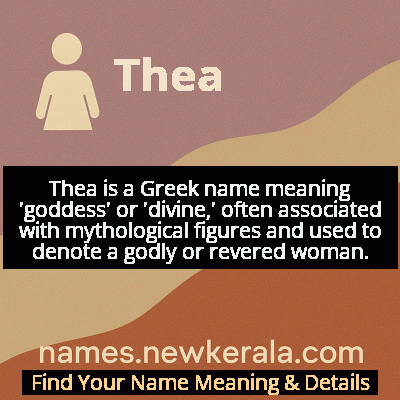Thea Name Meaning & Details
Origin, Popularity, Numerology Analysis & Name Meaning of Thea
Discover the origin, meaning, and cultural significance of the name THEA. Delve into its historical roots and explore the lasting impact it has had on communities and traditions.
Name
Thea
Gender
Female
Origin
Greek
Lucky Number
7
Meaning of the Name - Thea
Thea is a Greek name meaning 'goddess' or 'divine,' often associated with mythological figures and used to denote a godly or revered woman.
Thea - Complete Numerology Analysis
Your Numerology Number
Based on Pythagorean Numerology System
Ruling Planet
Neptune (Ketu)
Positive Nature
Intuitive, analytical, spiritual, and inquisitive.
Negative Traits
Secretive, reserved, aloof, and can be overly critical.
Lucky Colours
Green, yellow.
Lucky Days
Monday.
Lucky Stones
Cat’s eye, moonstone.
Harmony Numbers
1, 5, 6.
Best Suited Professions
Scientists, researchers, spiritual leaders, detectives.
What People Like About You
Depth of knowledge, analytical skills, spirituality.
Famous People Named Thea
Thea von Harbou
Screenwriter and novelist
Wrote the screenplay for Fritz Lang's groundbreaking 1927 film 'Metropolis'
Thea Musgrave
Composer
Renowned Scottish composer known for her operas and orchestral works
Thea Sharrock
Theatre and film director
Youngest artistic director in West End history, directed 'Me Before You'
Thea Queen
Fictional character
Major character in CW's 'Arrow' television series as Speedy/Arsenal
Name Variations & International Equivalents
Click on blue names to explore their detailed meanings. Gray names with will be available soon.
Cultural & Historical Significance
Throughout history, Thea evolved from its mythological origins while maintaining its connection to divine femininity. During the Renaissance, classical names experienced revival among intellectuals and artists. In the 19th century, Thea gained popularity as a given name, often used as a short form of Dorothea ('gift of god') or Theodora ('god's gift'). The name's elegant simplicity and classical roots have made it enduring across Western cultures, while its meaning of 'divine' or 'goddess' continues to resonate with parents seeking names that convey strength, beauty, and spiritual significance.
Extended Personality Analysis
Individuals named Thea are often perceived as creative, intuitive, and spiritually aware, embodying the luminous qualities of their mythological namesake. They tend to possess a natural elegance and grace that draws others to them, combined with strong intellectual curiosity and artistic sensibilities. Theas are frequently described as having an illuminating presence - they light up rooms with their energy and have a knack for inspiring those around them. Their connection to the Titan goddess of sight often translates into personality traits of insightfulness, clarity of thought, and the ability to see possibilities where others see obstacles.
Many Theas demonstrate leadership qualities tempered with empathy, making them effective in both professional and personal relationships. They often excel in creative fields, education, or healing professions where their natural intuition and ability to 'see clearly' can benefit others. Theas tend to be independent thinkers who value authenticity and depth in their relationships. While they can be reserved initially, they form deep, meaningful connections with those they trust. Their mythological heritage as the mother of celestial bodies suggests nurturing qualities combined with the ability to guide others toward enlightenment and understanding, making Theas often sought out for wisdom and counsel.
Modern Usage & Popularity
Thea has experienced a remarkable resurgence in popularity over the past two decades, particularly in English-speaking countries and Scandinavia. In the United States, it ranked #273 in 2022, showing dramatic growth from #942 in 2000 according to Social Security Administration data. The name enjoys even greater popularity in European countries - in Norway it ranked #15 in 2021, while in Sweden it consistently appears in the top 50. This modern revival can be attributed to several converging trends: the movement toward shorter, classic names with historical significance, the influence of popular culture (particularly the character Thea Queen in CW's 'Arrow' series), and parents' preference for names that are both feminine and strong. Thea's versatility as both a standalone name and a nickname for longer names like Dorothea, Althea, or Theodora contributes to its broad appeal across different naming styles. Its cross-cultural accessibility and elegant simplicity make it a favorite among parents seeking a name that's both timeless and contemporary.
Symbolic & Spiritual Meanings
Symbolically, Thea represents illumination in its fullest sense - from the literal light of celestial bodies to the metaphorical light of wisdom, understanding, and spiritual enlightenment. The name carries deep connections to vision, both physical sight and inner insight, reflecting Theia's role as the Titan goddess of sight. In symbolic interpretation, Thea represents the ability to see truth beyond surface appearances and to perceive the divine in the ordinary. The name also embodies generative power and cosmic order, as Theia was the mother of the sun, moon, and dawn - celestial bodies that govern natural cycles and the passage of time. This makes Thea symbolic of creation, nurturing, and the interconnectedness of all things in the universe. In modern spiritual contexts, Thea represents the inner light within each person - that spark of divinity, creativity, and potential that drives human achievement and personal growth. The name suggests someone who brings clarity to confusion, hope to darkness, and understanding to complexity, serving as a beacon for others seeking direction and meaning.

